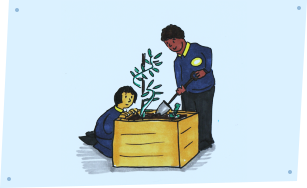Spanish
Intent
Our Spanish curriculum includes a wide variety of topics and themes to excite and inspire. All pupils are expected to achieve their full potential by encouraging high expectations and excellent standards in their foreign language learning so pupils will be willing and able to continue studying languages beyond primary school. Learning a second language also offers pupils the opportunity to develop a deeper understanding of other cultures and the world around them.
Through our Spanish curriculum we intend to:
- Follow a dynamic scheme of work that will be clearly outlined in both long-term and short-term planning. This will ensure that the foreign language knowledge of our pupils progresses within each academic year and is extended year upon year throughout the primary phase meeting or exceeding national curriculum requirements.
- Teach the four key language learning skills; listening, speaking, reading and writing and cover all necessary grammar in an age-appropriate way. This will enable pupils to use and apply their learning in a variety of contexts, laying down solid foundations for future language learning and also helping the pupils improve overall attainment in other subject areas.
- Develop a genuine interest and positive curiosity about foreign languages.
- Re-visit concepts and vocabulary during the year to embed understanding.
- Support all pupils to make good progress in Spanish.
- Find cross curricular opportunities.
- Create a safe atmosphere in the lessons where students will be willing to participate, ask questions and share their ideas.
Implementation
All classes have access to well-planned weekly lessons. Pupils will progressively acquire, use and apply a growing bank of vocabulary, language skills and grammatical knowledge organised around topics and themes. Pupils will build on previous knowledge gradually as their foreign language lessons continue to recycle, revise and consolidate previously learnt language whilst improving all four language skills. Pupils’ learning and progression will be assessed at regular intervals. We encourage children’s confidence and curiosity about languages, developing their awareness of cultural differences in other countries, through our curriculum enrichment opportunities.
To deliver our Spanish curriculum we will:
- Plan differentiated lessons to meet the needs of all pupils. Extra resources will be provided for pupils in our school who are native speakers.
- Provide opportunities to remember and revisit key concepts and skills.
- Offer reading, writing, speaking and listening activities across all topics.
- Include grammar concepts which will increase in complexity as pupils move from Year 3 to Year 6.
- Provide cross curricular opportunities for example: mathematical calculations and word problems in the target language, comparing Spanish grammar with English, describing Miro and Picasso’s work, giving opinions about different music styles, talking about healthy eating, describing and comparing planets or talking about the Olympic games.
In addition to the Spanish scheme of work and resources for lessons, we offer a range of opportunities to extend and develop cultural capital. For example, we run a weekly Spanish Club for pupils in upper school. In Spanish club pupils learn more about the language and about Spanish and Latin American culture through traditional games, songs, dance, craft activities and cooking. Some examples of the cooking are: making guacamole, tapas and gazpacho and learning how to dance sevillanas and salsa. We also hold a football match calling it ‘El Clásico’ where pupils represent Real Madrid and Barcelona, cheering their teams in Spanish.
Our school has also a partnership with a school in Requena. Year 6 pupils write letters to our Spanish friends practising Spanish in a real-life context and learning more about Spanish culture. Year 6 also have the opportunity to perform plays based on traditional Fairy Tales in Spanish.
Different rooms, equipment and resources throughout the school are labelled in Spanish to encourage pupils to learn more vocabulary independently throughout their day. There is a Spanish board where outcomes of each year group are displayed centrally and facts about Hispanic festivals, like Día de los Muertos o Cinco de Mayo inform the pupils or interesting Spanish culture.
Impact
The impact of our intent and implementation of the Spanish curriculum can be seen in the students’ Spanish books, learning outcomes and discussion with the children. The impact is also reflected in the progressive planning for skills development.
The impact of our Spanish curriculum is measured by:
- Pupils using the target language in the classroom.
- Pupils’ enthusiasm in lessons and when talking about the subject outside the classroom.
- Pupils’ interest in being part of the Spanish club and participating in plays and conversations.
- An ability to recognise patterns and links between Spanish and other languages.
- Pupils’ recall on previous knowledge to help them to develop and build on their language skills.
- A specialist teacher having a deep and secure knowledge of how to teach Spanish.
Assessment:
Assessment for learning occurs throughout our Spanish lessons. Progress is monitored by differentiated questioning, use of mini whiteboard, self and peer-assessment, class work and contributions through discussion. This monitoring is essential for future planning and creation of resources. Pupils are also given feedback during lessons and written work is marked in line with the school marking policy. At the end of the term, pupils complete a formative assessment. This information is recorded and monitored by the teacher to track pupil’ progress to help them to achieve their full potential.

